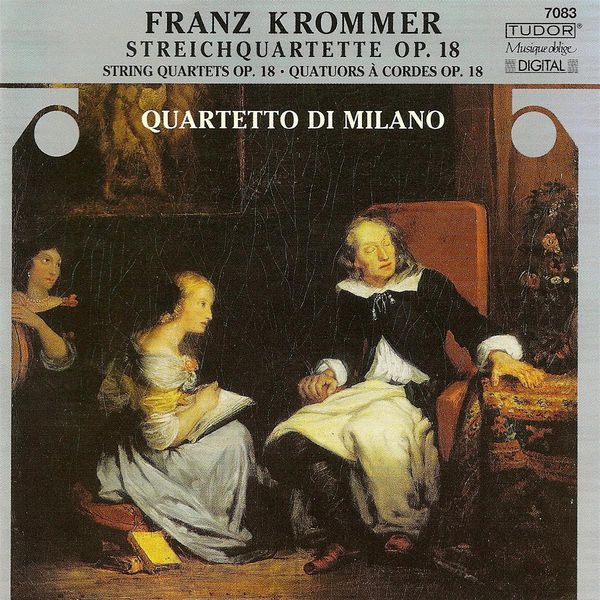
Streaming illimitato
Ascolta subito questo album in alta qualità sulle nostre app
Inizia il mio periodo di prova e riproduci l'albumGoditi questo album sulle app Qobuz con il tuo abbonamento
AbbonatiGoditi questo album sulle app Qobuz con il tuo abbonamento
Download digitale
Acquista e scarica questo album in più formati, secondo le tue esigenze.
Lingua disponibile: inglese
Viennese composer Franz Krommer was born in Bohemia and also used his birth name, Frantisek Kramar. He was younger than Haydn but slightly older than Beethoven, who at first regarded him as potential competition in the string quartet genre but then stopped worrying. That was because there is little expression in quartets like these; as Quartetto di Milano member Thomas Wicky-Borner put it in his notes, Krommer "hardly ever reveals himself to us in his compositions." Written in the late 1790s, these works belong with the Classical era and not the Romantic, and in the minuet form, where Haydn had said everything that could be said, they are not very interesting. That said, Krommer did absorb one major aspect of Beethoven's string quartet language: like Beethoven's, these are not quartets for amateurs. The first-violin parts require a serious player, and these three quartets in general abound with flashy contrasts in texture and in passages that are big without being quasi-orchestral. The last movement of the String Quartet in D major, Op. 18/1, is an example of a movement that follows Haydn's formal designs but gooses them with fancy fingerwork. The outer movements of all three of these quartets are exciting for the listener, with a vigor that sets them apart from Hummel's expansive structure, and they pose challenges to the players that the Quartetto di Milano surmounts for the most part. Sometimes the group lays on Beethovenian intensity where the music can't really support it, and sometimes when it really digs into the strings they are not perfectly in tune. For the most part, however, this is a good introduction to the string quartets of a nearly forgotten composer of the First Viennese School.
© TiVo
Al momento stai ascoltando degli estratti.
Ascolta oltre 100 milioni di brani con un abbonamento streaming illimitato.
Ascolta questa playlist e più di 100 milioni di brani con i nostri abbonamenti di streaming illimitato
A partire da 12,49€/mese

Quartetto di Milano, Ensemble
Quartetto di Milano, Ensemble
Quartetto di Milano, Ensemble
Quartetto di Milano, Ensemble
Quartetto di Milano, Ensemble
Quartetto di Milano, Ensemble
Quartetto di Milano, Ensemble
Quartetto di Milano, Ensemble
Quartetto di Milano, Ensemble
Quartetto di Milano, Ensemble
Quartetto di Milano, Ensemble
Quartetto di Milano, Ensemble
Approfondimenti
Viennese composer Franz Krommer was born in Bohemia and also used his birth name, Frantisek Kramar. He was younger than Haydn but slightly older than Beethoven, who at first regarded him as potential competition in the string quartet genre but then stopped worrying. That was because there is little expression in quartets like these; as Quartetto di Milano member Thomas Wicky-Borner put it in his notes, Krommer "hardly ever reveals himself to us in his compositions." Written in the late 1790s, these works belong with the Classical era and not the Romantic, and in the minuet form, where Haydn had said everything that could be said, they are not very interesting. That said, Krommer did absorb one major aspect of Beethoven's string quartet language: like Beethoven's, these are not quartets for amateurs. The first-violin parts require a serious player, and these three quartets in general abound with flashy contrasts in texture and in passages that are big without being quasi-orchestral. The last movement of the String Quartet in D major, Op. 18/1, is an example of a movement that follows Haydn's formal designs but gooses them with fancy fingerwork. The outer movements of all three of these quartets are exciting for the listener, with a vigor that sets them apart from Hummel's expansive structure, and they pose challenges to the players that the Quartetto di Milano surmounts for the most part. Sometimes the group lays on Beethovenian intensity where the music can't really support it, and sometimes when it really digs into the strings they are not perfectly in tune. For the most part, however, this is a good introduction to the string quartets of a nearly forgotten composer of the First Viennese School.
© TiVo
A proposito dell'album
- 1 disco(i) - 12 traccia(e)
- Durata totale: 01:06:57
- Artista principale: Quartetto di Milano
- Compositore: Franz Krommer
- Etichetta: Tudor
- Genere: Classica
 Perché acquistare su Qobuz
Perché acquistare su Qobuz
-
Ascolta la tua musica in streaming o download
Acquista un album o una singola traccia. Oppure ascolta il nostro intero catalogo con i nostri abbonamenti streaming illimitati di alta qualità.
-
Zero DRM
I file scaricati ti appartengono, senza limiti d’uso. Puoi scaricarli tutte le volte che vuoi.
-
Scegli il formato più adatto a te
Scarica i tuoi acquisti in un'ampia varietà di formati (FLAC, ALAC, WAV, AIF ...) a seconda delle tue esigenze.
-
Ascolta i tuoi acquisti sulle nostre app
Scarica le app Qobuz per smartphone, tablet e computer e ascolta i tuoi acquisti dappertutto.



